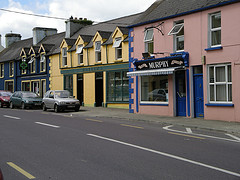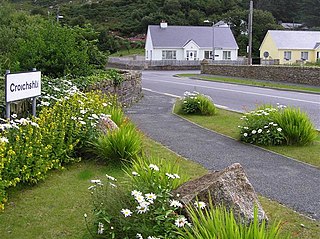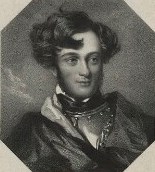
County Donegal is a county of Ireland in the province of Ulster and in the Northern and Western Region. It is named after the town of Donegal in the south of the county. It has also been known as County Tyrconnell or Tirconaill, after the historic territory. Donegal County Council is the local council and Lifford is the county town.

An Clochán Liath, known in English as Dungloe, is a town on the west coast of County Donegal in Ulster, the northern province in Ireland. It is the main town in The Rosses and the largest in the Donegal Gaeltacht. Dungloe developed as a town in the middle of the 18th century, and now serves as the administrative and retail centre for the west of County Donegal, and in particular The Rosses, with the only mainland secondary school for the area.

Gweedore is a Gaeltacht (Irish-speaking) district and parish located on the Atlantic coast of County Donegal in the north-west of Ireland. Gweedore stretches some 26 kilometres (16 mi) from Glasserchoo and Bloody Foreland in the north to Crolly in the south and around 14 kilometres (9 mi) from Dunlewey in the east to Magheraclogher and Magheralosk in the west, and is sometimes described as one of Europe's most densely populated rural areas. It is the largest Irish-speaking parish in Ireland with a population of around 4,065, and is also the home of the northwest regional studios of the Irish-language radio service RTÉ Raidió na Gaeltachta, as well as an external campus of the University of Galway. Gweedore includes the settlements of Brinlack, Bunbeg, Derrybeg, Crolly and Dunlewey, and sits in the shade of County Donegal's highest peak, Errigal.

Údarás na Gaeltachta, abbreviated UnaG, is a regional state agency which is responsible for the economic, social and cultural development of Irish-speaking (Gaeltacht) regions of Ireland. Its stated purpose is to strengthen the Gaeltacht communities, to increase the quality of life of its community members and facilitate the preservation and extension of the Irish language as the principal language of the region. It gives funding to small local businesses that have to compete with foreign companies.

Creeslough is a village in County Donegal, Ireland, 12 kilometres (7 mi) south of Dunfanaghy on the N56 road. The small village overlooks an arm of Sheephaven Bay, with the population of the surrounding area engaged mainly in agriculture, mostly livestock rearing.

The twin villages of Ballineen and Enniskeane, or Enniskean, in County Cork in Ireland are 43 km (26.72 mi) southwest of Cork City, on the R586 road. The linear settlement lies on the River Bandon between Bandon and Dunmanway. The combined settlement is designated as a 'key village' by Cork County Council for planning purposes and, as of the 2016 census, had a population of 692 people.

Frankie Kennedy was a flute and tin whistle player born in Belfast, Northern Ireland. He was also the co-founder of the band Altan, formed with his wife Mairéad Ní Mhaonaigh. The popular Frankie Kennedy Winter Music School was founded in 1994 in his honour.
Eugene Greene was a Catholic priest in the Raphoe diocese of the County Donegal, Ireland. In 1999, he was arrested for abusing 26 boys between 1965 and 1992. In 2000, Greene was sentenced to 12 years in prison, of which he only served nine. He was released in 2008.

Gort an Choirce or Gort a' Choirce, anglicised as Gortahork, is a village and townland in the northwest of County Donegal, Ireland. It is a Gaeltacht community, where the Irish language is the main language spoken in the area. Along with Falcarragh, it forms part of the district known as Cloughaneely.

An Fál Carrach, sometimes called Na Crois Bhealaí, is a small Gaeltacht town and townland in the north-west of County Donegal in Ulster, the northern province in Ireland. The settlement is in the district and old parish of Cloughaneely.

An Bun Beag, meaning "the small river mouth", is a small Gaeltacht village and townland in County Donegal, Ireland. It is officially the smallest townland in Gaoth Dobhair (Gweedore), but today the name Bunbeg is used to describe a large region of the parish. It is situated between Derrybeg and the townland of Dore and is home to many of Gweedore's amenities and businesses. The Clady River flows into the Crolly River beside Bunbeg Quay, on the south-western outskirts of Bunbeg.
Alexander Blane was an Irish nationalist politician and Member of Parliament (MP) for South Armagh, 1885–92. He was a supporter of Charles Stewart Parnell during the Split in the Irish Parliamentary Party, and later a pioneering Socialist. In 1876 he was appointed agent to the Catholic Registration Association, an organization dedicated to maximising the Catholic vote. He was also president of the Prisoners’ Aid Society.

CLG Ghaoth Dobhair is a GAA club based in the parish of Gaoth Dobhair in northwest County Donegal, Republic of Ireland. They are one of the strongholds of Gaelic football in County Donegal.

Croithlí or Croichshlí is a village in the Gaeltacht parishes and traditional districts of Gweedore and The Rosses in the west of County Donegal in Ulster, the northern province in Ireland. The two 'districts' are separated by the Crolly River. It has one convenience shop/restaurant and petrol station and one public house, Páidí Óg's. Crolly is located in two baronies: the Gweedore part of the village is in the Barony of Kilmacrenan, while The Rosses part of the village is in the Barony of Boylagh, the Crolly River being the boundary between the two baronies.

The Roman Catholic Diocese of Romblon is a diocese of the Catholic Church in the Philippines. A constituent of the sui iuris Latin Church, it is a suffragan of the Archdiocese of Capiz. Its titular patron is St. Joseph, spouse of the Blessed Virgin Mary, and its secondary patron is the Santo Niño. Erected in 1974, the diocese has experienced no jurisdictional changes in that time.

St. Bride's Church was a Church of Ireland church located at the corner of Bride Street and Bride Road, Dublin, Ireland.
Comórtas Peile na Gaeltachta is an annual All Ireland Gaelic football competition contested by clubs from the Irish language-speaking Gaeltacht areas of Ireland. Clubs compete on a county-basis at first, in order to qualify for the tournament that is hosted by a different club from the Gaeltacht each year. The first competition was held in Gweedore, County Donegal in 1969 and was won by the local club CLG Ghaoth Dobhair. RTÉ Raidió na Gaeltachta provides radio coverage of both the regional qualifiers and the national finals, held over the June Bank Holiday. TG4 provides live television coverage of the men's semi-finals and finals on the June Bank Holiday Sunday and Monday, and these are also broadcast online.

Alexander Aloysius "Alan" McGuckian, SJ is the Bishop of Down and Connor who was appointed on 2 February 2024.

Lord George Augusta Hill was an Anglo-Irish military officer, politician and landowner.

















